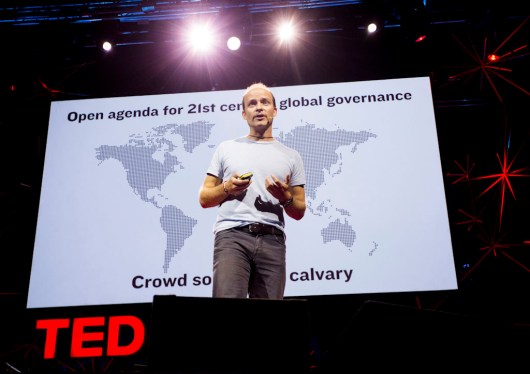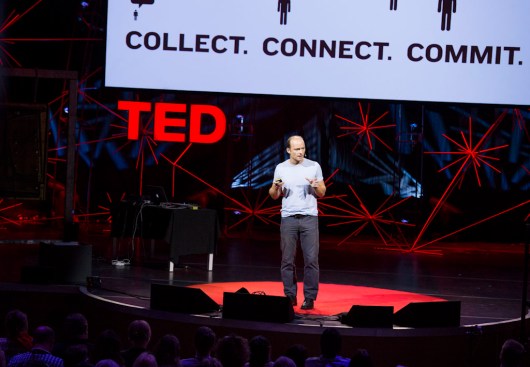Photo: Ryan Lash
Remember Y2K?
Jamie Drummond starts by taking us back to the most anticipated year in human history: 2000. “Remember that? Y2k, the dotcom bubble… the deep-down inchoate yearning that our millennium moment should mean more than a two and some zeros.”
Incredibly, he says, our leaders agreed, and as a result produced the Millenium Development Goals. For the few people who don’t have them memorized (i.e., most people) the goals are basically these: Developing countries pledged to halve death from disease, poverty and hunger by 2015, while the developed countries promised to help them by dropping debt.
We’re now approaching the deadline, and we should start to ask the questions, “How did we do? Do we like these big global goals? What should the new goals be? What does the world want?”
A lot of progress has been made by the private sector, political leaders, activists and grassroots organizations across the world. There have been incredible results:
- Life-saving anti-retrovirals have been delivered to 6 million people, up from 50,000.
- Deaths from malaria have halved.
- 5 million lives have been saved by innoculations.
- 5,000 fewer children are dying every day.
This, says Drummond, is “living proof of progress worth saving.”
Still, there is a lot more to do.
Photos: James Duncan Davidson
The overall goals are likely not going to be met. Every year, 7.6 million children die from preventable diseases, and 1.7 are malnourished to point of stunting.
But more than that, there are many things not in goals: Sustainable development goals, natural resource goals, equity, transparency, and more.
Currently, says Drummond, “Technocrats appointed by the UN and governments are busying themselves redesigning goals, and they’re doing that with the same 20th-century elite topdown closed process.” He is proposing a way to open that up. Unlike in 2000, the web and reality TV connect people from every corner. He wants to connect people around the world in a giant global poll. This would be a historic first: “A poll and consultation where everyone, everywhere has an equal voice for the very first time.”
The first step is to collect core data: commission a scientific poll. Ask 1,001 peopple in every nation what they want the new goals to be; make real efforts to reach the poorest, and put their views at heart of the information; collect baseline data to measure progress.
After that, connect it with the big crowd. Finetune options with citizens, and with experts such as doctors, around the world, and find ways to weight options and vote on preferences. Drummond imagines a fantasy coalition of gaming companies, social media and reality TV to engage interest. After all, more people vote in those arenas than in national elections.
He cites examples of pieces of this working: Kenya Open Data monitors data on projects in Kenya to make sure they deliver results. And of course, there is Ushahidi, which collects data about emergencies via text and mobile phones.
“Citizens on the edge of a network are empowered,” says Drummond, “because the grassroots level forces openness.” In the spirit of that openness, he sates, “I’ve got an agenda.” It’s an agenda driven by concern over long-term trends, which suggest a growing population and growing consumption, which will lead to competing over natural resources.
We are the cavalry
Drummond asks us to look at the G20 meeting in Mexico last week, or the Rio+20 summit last week — “both, if we’re honest, a bust.” The world leaders, he says, “can’t get it done, they need our help, they need a cavalry, and it’s not going to come from Mars, it’s going to come from us.”
He ran a campaign called “Make poverty history.” Many made fun of the idea, and he agrees it was naive. But he shows a graph showing that extreme poverty, people living on less than $1.25 a day, is on a strongly downward trend. Again, there are 5,000 fewer children dying every day. (In the Q&A afterward, Chris Anderson points out that that effect is huge, but is entirely invisible and not talked about. Drummond agrees, and wishes these results were more widely known.)
Sure, says Drummond, it gets harder, with the remaning poor increasingly located in fragile post-conflict states, but he thinks it is possible. “I’m sure that with technological, political and campaigning innovation combined, working as one — we can get this job done.”


Comments (7)
Pingback: Let's talk about poo: Fellows Friday with Francis de los Reyes III | TEDFellows Blog
Pingback: Crowdsourcing the New Millennium Development Goals: « Post2015.org – what comes after the MDGs?
Pingback: The magic of a group think: TEDGlobal 2012 Day 1 recap « Content Curated By Darin R. McClure & a few photos
Pingback: atomia-site-title